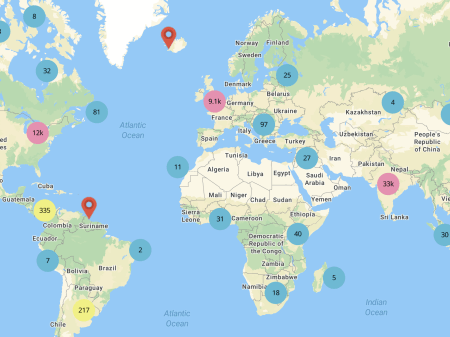
On 17 November the members of the International Co-operative Alliance will elect a new board of directors at their board meeting in Kuala Lumpur, Malaysia. Given the many upcoming governance changes associated with a new president and executive, this will mark a turning point in the global co-operative movement. This was the setting for the recent chat between the eDigest team and outgoing president Monique F. Leroux. The Kuala Lumpur meeting will be Ms Leroux’s last opportunity to address co-operators as president of the International Co-operative Alliance.
Ms Leroux, you have been at the helm of the International Co-operative Alliance for two years, and served two years as a member of the board of directors. What would you consider your greatest accomplishment?
In my opinion, the International Co-operative Alliance stands out for its tremendous resiliency over the years and the key role it has played in guiding co-operators through their evolution. The Alliance has been around for more than 120 years, and has always adapted to the needs of its members. The board of directors is in a way a guardian of the Alliance’s pertinence and progress on behalf of its members.
The global socio-economic context is constantly changing. Sustainable development issues endure, and new challenges crop up, such as technological advances and new collaborative economies. All of this has prompted the Board to give careful thought to what kind of support the Alliance can provide. We addressed a number of aspects, in particular our membership, governance, communications, finances and the involvement of primary co-operatives. We also listened to the Alliance’s members on these key points, always with the aim of continuing to promote the co-operative movement and its business model.
These considerations are reflected in the Alliance’s strategic plan, which constitutes an important reference point in the implementation of the Blueprint for a co-operative decade. Throughout that process, the Alliance’s board and members remained completely open-minded, which allowed for frank and stimulating discussions.
This commitment on the part of its board and members to the Alliance’s survival and its key contribution to the cause of building a better world is what makes me proudest.
Over the past few years, the Alliance has made several representations, including to international bodies. Do you believe that the international co-operative movement’s message is getting out there?
I often say that the co-operative movement is a quiet power. We make an important contribution to communities, and our business model promotes stability in local, national and international economies. However, it is not easy to convince some people of our significance or to tell our story. The Cooperatives for a better world marketing campaign is a very interesting initiative that highlights co-operative stories around the world. I fervently hope that co-operators will keep contributing to that platform, because it is a communication tool that has the potential to become very powerful for our movement.
For my part, over the past few years I have had the privilege of contributing to the work of the B20. This year in particular, I had the opportunity to be involved as co-chair of the working group on small and medium-sized businesses. That was an incredible way to promote our business model.
The Alliance’s recommendations concerned the importance of introducing winning conditions for creating an environment that is conducive to the creation of sustainable businesses, quality jobs and modalities to facilitate access by local producers to global markets. In fact, many of the recommendations and suggestions were included in the final recommendations to the G20. I would like to underline the important work done by the members of the board and of the Alliance who contributed to the different working groups. Together, we managed to highlight the value of the cooperative business model, and our efforts paid off.
You were also appointed by the prime minister of Canada to the Canada-United States Council for Advancement of Women Entrepreneurs and Business Leaders. You were the first woman elected as president and CEO of the Desjardins Group, and you are just about to complete your mandate as president of the Alliance. Would it be fair to say that you are a prime example of a woman who has broken through the glass ceiling?
I couldn’t say if I’m a prime example, but I do know that I firmly believe that women have a role to play in decision-making circles. Co-operative businesses are ahead of the times in terms of introducing measures to promote the advancement of women, but there is still a long way to go. The businesses that will stand out over the coming years are the ones that will be able to identify tomorrow’s leaders in their teams, including the next generation.
Co-operative businesses will not escape the reality of an aging population and labour shortages. As a global movement, we have to assume a certain degree of leadership in introducing innovative management models that ensure fair recognition of everyone’s contribution.
In fact, that is the reason why the Young Leaders program was established at the International Summit of Cooperatives. Since 2012, that program has provided a forum and exceptional networking opportunities for more than 700 young co-operators around the world. The program grows with every Summit edition, and is a source of great pride for the global co-operative movement.
Co-operative businesses will never cease to face new challenges associated with globalisation, technological advances and countless new economies. What kind of leadership and unique contribution do you think co-operatives can bring amidst these new trends?
I believe that the co-operative movement has two advantages: the group’s strength and its capacity to innovate thanks to its local foothold and global vision. The co-operative movement is a tremendous network of businesses in different sectors. We absolutely must make the most of that advantage. One way would be to establish a platform that would permanently connect businesses to promote business development, to create a place conducive to innovation, and to pool different needs in terms of everything from training to purchasing.
There is an interesting international project currently taking shape in Canada, the International Cooperative Centre, which will give co-operatives their very own platform. I believe that co-operative leaders would be well advised to explore that promising option, which I have no doubt would open a multitude of possibilities and enable cooperative businesses to assume a significant place in the markets.
At the last International Summit of Cooperatives, the movement formally undertook to commit to the UN Sustainable Development Goals. Do you think this will be followed up?
The global co-operative movement is always attuned to the UN sustainable development goals. Basically, those goals are perfectly aligned with our mission. We are a key vehicle for driving change in the world, and a solid pillar complementing the private and public sectors.
The Coops for 2030 platform lists several initiatives by co-operatives around the world. We combined them to produce a document that was sent to socio-economic leaders in order to make them aware of our day-to-day work. Last year, I had the chance to speak to several ambassadors during a visit to the United Nations, and many of them were extremely receptive to the work we do every day.
You will soon be passing on the torch. Are you preparing for your departure with a sense of having accomplished what you set out to do?
The co-operative movement faces many challenges. It was my great privilege to spend the past four years working with a devoted and committed board of directors that feels so strongly about advancing co-operative businesses. The Alliance is certainly in a decent position to continue moving towards objectives that, ultimately, will help make our world a better place.




